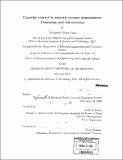Capacity control in network revenue management : clustering and risk-aversion
Author(s)
Park, Joongwoo Brian
DownloadFull printable version (3.128Mb)
Other Contributors
Massachusetts Institute of Technology. Dept. of Electrical Engineering and Computer Science.
Advisor
Vivek F. Farias.
Terms of use
Metadata
Show full item recordAbstract
Network revenue management is the practice of using optimal decision policies to increase revenues by controlling limited quantities of multiple resources' availability and prices over finite time. It is widely practiced in capacity-constrained service industries such as the airlines, hotels, car rentals, and cruise-lines. A variety of control methods has been introduced for network resource capacity control problem. We propose a clustering method to improve approximation quality. By clustering the legs of the network, one can find tighter upperbound than leg-wise decomposition with loss of computation speed due to larger state space. We have shown that there is more than 6% revenue improvement opportunity by finding the right clustering. With local interchange heuristic and generic heuristics, finding a locally optimal clustering can be done in faster time. We also introduce risk-aversion in network revenue management. We have investigated risk-aversion on network revenue management and also study the impact of risk-aversion parameters in the optimization model on relative revenue-risk performance.
Description
Thesis (S.M.)--Massachusetts Institute of Technology, Dept. of Electrical Engineering and Computer Science, 2010. Cataloged from PDF version of thesis. Includes bibliographical references (p. 53-54).
Date issued
2010Department
Massachusetts Institute of Technology. Department of Electrical Engineering and Computer SciencePublisher
Massachusetts Institute of Technology
Keywords
Electrical Engineering and Computer Science.